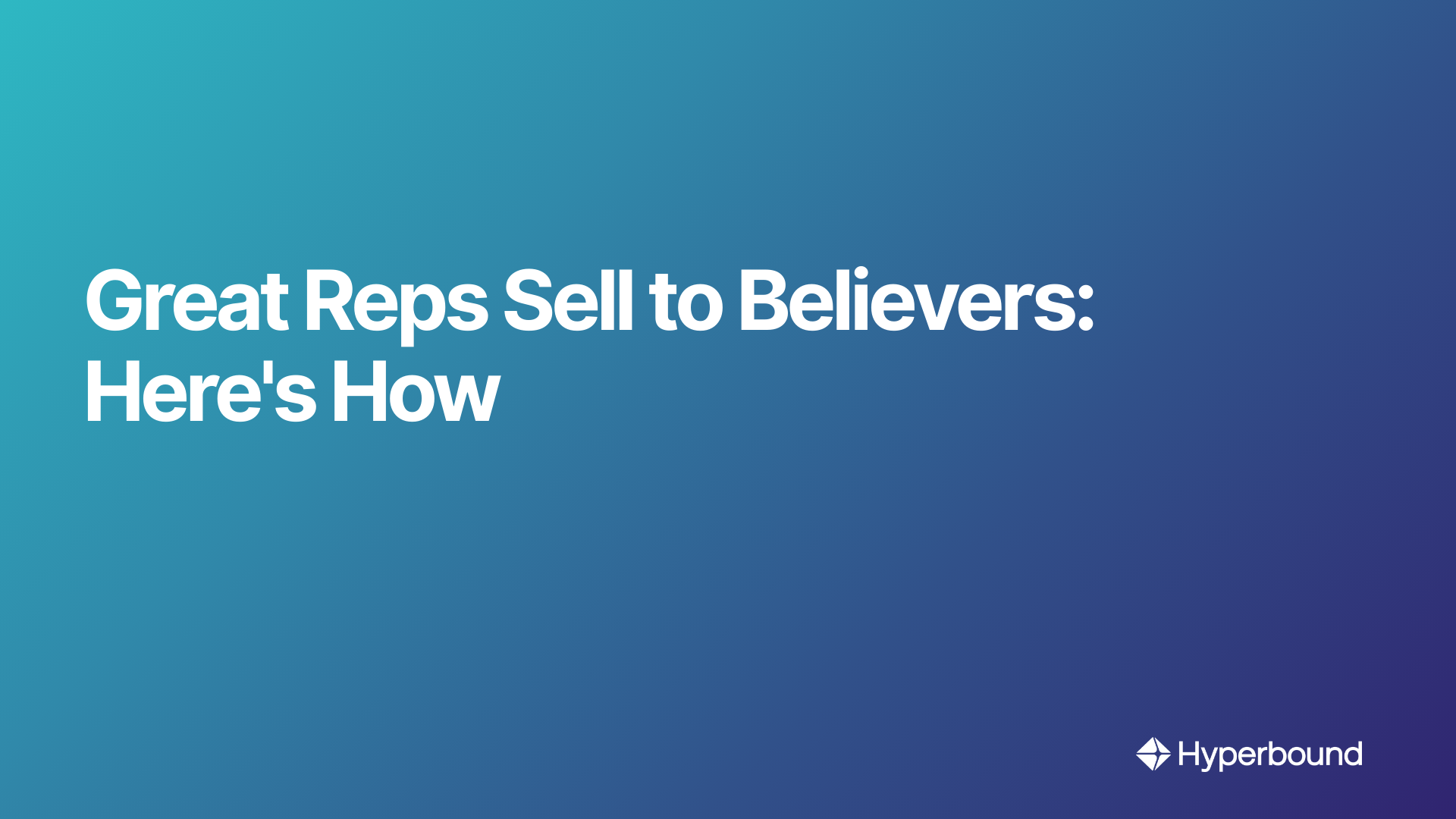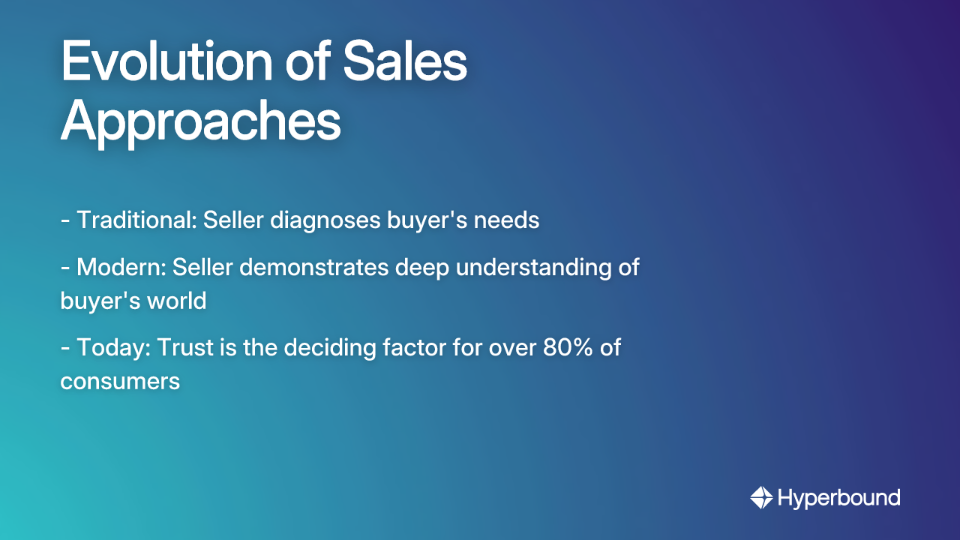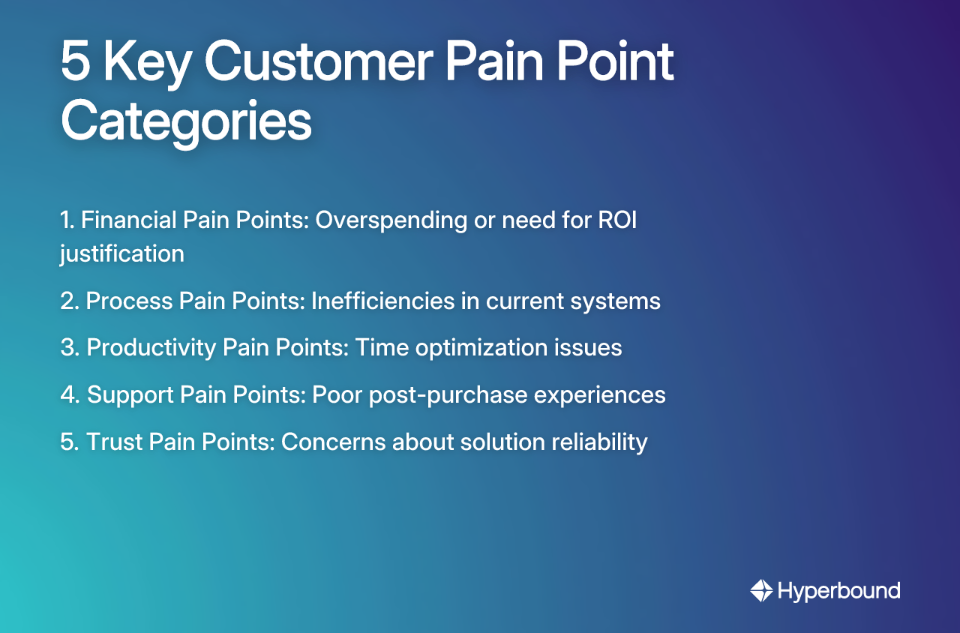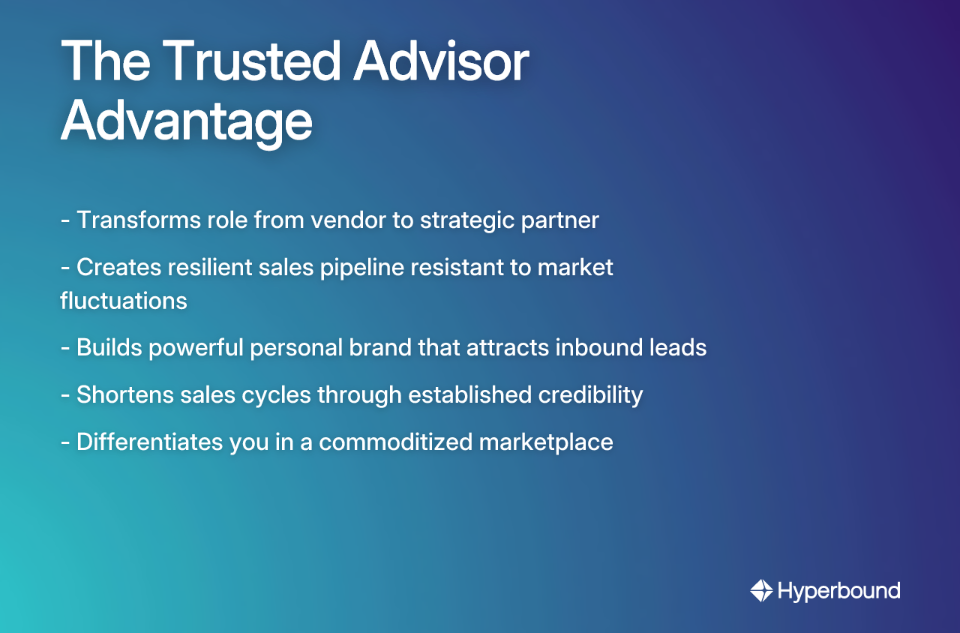
You're in a high-stakes B2B sales call. You've rehearsed your pitch perfectly. Your slide deck showcases every impressive feature of your SaaS solution. But as you speak, you notice the prospect's eyes glazing over. They're nodding politely, but you can feel it – they're just waiting for you to finish so they can say, "We'll think about it and get back to you."
Sound familiar?
The harsh truth is that traditional feature-based selling is failing in today's sophisticated marketplace. With lengthening sales cycles and tightening budgets in the post-ZIRP economy, prospects are increasingly skeptical of sales pitches, no matter how polished. As one struggling rep recently confessed on Reddit, "Clients often distrust consultants who lack real-world experience," highlighting the credibility gap many salespeople face.
But elite sales professionals have discovered a powerful alternative: they don't sell to prospects – they convert believers.
The Mindset Shift: From Quota-Crusher to Trusted Advisor
The foundation of selling to believers requires a fundamental psychological shift. You must move beyond focusing on your own pressures (quotas, commission, pipeline targets) to genuinely serving the prospect.
This isn't just feel-good advice – it's a strategic imperative. According to Forbes, emotional factors heavily influence purchasing decisions, often more than facts and data. Busy executives prefer engaging with trusted advisors, not typical sales reps pushing for quick closes.
The evolution of consultative selling reflects this reality:

Today's buyers are more informed than ever, making basic consultative selling just the "price of entry." Research from RAIN Sales Training shows that over 80% of consumers consider trust a deciding factor in their purchases.
When you shift from pushing products to solving problems, something remarkable happens: your value proposition resonates on a deeper level, prospects open up about their internal politics, and your sales cycle naturally accelerates.
The Art of Discovery: How to Uncover a Customer's Real Pain
You can't solve a problem you don't truly understand. This is where most sales efforts fail – they focus on surface-level pain points without digging deeper to uncover the real motivations driving purchase decisions.
To master discovery, start by categorizing customer pain points using this framework from iPullRank:

With this framework in mind, you can ask targeted, open-ended questions that encourage detailed responses. For example:
- "What are the biggest obstacles to achieving your department goals this year?"
- "How does this challenge impact your team's ability to meet objectives?"
- "What would be the COI (Cost of Inaction) if this issue remains unsolved?"
Many sales professionals struggle with what one rep described on Reddit as the "difficulty in establishing a genuine connection with potential customers to uncover their pain points." This is where practice becomes crucial. AI-powered tools like Hyperbound's AI Sales Roleplays provide a safe environment for reps to practice these delicate discovery conversations, build confidence, and master the art of uncovering true pain points before a high-stakes call.
Beyond individual practice, the solution is to leverage your entire organization:
- Collaborate with customer success teams who hear unfiltered feedback daily
- Study support tickets to identify recurring frustrations
- Hold joint meetings with front-line teams using the 5 W's framework:
- Who are the main competitors stealing business?
- What objections do potential customers consistently raise?
- Where do customers find the most issues in your product/service?
- When do questions typically arise in the sales cycle?
- Why do customers seek refunds or churn?
This comprehensive approach ensures you understand the customer's world better than they do – a prerequisite for becoming a trusted advisor.
The 6-Step Framework for Becoming a Trusted Advisor
To systematically build the trust necessary to create believers, follow this proven framework adapted from The Center for Sales Strategy:
Step 1: Demonstrate Empathy
Go beyond active listening. Show you genuinely care by seeing things from their perspective. Reference their specific needs in conversation with qualifiers like, "You mentioned your team struggles with..." This directly addresses the pain point many reps face of "difficulty in establishing credibility and personal connection with clients."
Step 2: Demonstrate Expertise
Give clients a reason to listen by sharing relevant experience and successes. This isn't about bragging; it's about building credibility. Talk about how you've helped similar clients overcome comparable challenges, especially when dealing with complex B2B relationships.
Step 3: Be a Problem Solver
Position yourself as a solution provider, not just another vendor pushing for PMF (Product Market Fit). Focus on their aspirations, not just problems. Shift the conversation toward their goals and how you can help them achieve a better future, using concrete examples of ROI from similar implementations.
Step 4: Be Human
Building rapport goes beyond business. Research prospects to find common ground or shared interests. This directly combats the common pain point expressed by one sales consultant: "Struggles with personal branding and relatability can hinder sales success."
Step 5: Define Your Personal Brand Story
Create a compelling narrative that weaves together your empathy, expertise, and motivations. Why do you do what you do? Why are you passionate about solving this specific type of problem? Your personal story should align with your company's value proposition while highlighting your unique perspective.
Step 6: Share Your Personal Brand Story
Actively communicate your story on platforms like LinkedIn and during networking events. This reinforces your identity as a trusted advisor, not just a rep trying to hit quotas. By consistently sharing valuable insights, you'll attract inbound leads who are already primed to view you as an authority.

Advanced Plays: Educate, Collaborate, and Persuade
Once you've mastered the fundamentals, elevate your approach to become truly indispensable. The top-performing sellers don't just solve problems; they redefine them.
Educate with New Ideas and Perspectives
Don't just respond to needs; anticipate them. Share insights about industry trends and challenge the status quo. According to RAIN Sales Training, winning sellers educate buyers on new ideas and perspectives, positioning themselves as thought leaders.
This approach is particularly effective when addressing complex challenges like those faced in territory assignment or when navigating internal politics at the prospect's organization. By bringing fresh insights, you become valuable even if they don't immediately buy, solidifying your position as an expert they'll turn to when they're ready.
Collaborate to Redefine Needs
Work with the buyer to co-create the solution. Engage them in a collaborative process to redefine their needs and explore new possibilities. This shifts the dynamic from a pitch to a partnership, making the solution "theirs" as much as it is yours.
One sales consultant shared on Reddit: "Need for authentic relationships to build trust in consulting solutions." By involving prospects in the solution design, you transform the traditional buyer-seller relationship into a collaborative partnership focused on shared success.
Persuade with Impact
Go beyond features and benefits. Help the buyer visualize and feel the impact of your solution. Frame the outcome in terms of achieving their aspirations and solving their deepest frustrations.
Use metrics like ROI and COI (Cost of Inaction) to make the impact tangible:
- "If we implement this CRM solution, based on similar clients, you can expect a 15% reduction in customer churn."
- "Every month you delay implementation costs your organization approximately $50,000 in lost productivity."
These concrete impact statements help prospects justify the investment internally and build consensus among decision-makers.
The Long Game of Building Believers

Great reps understand that selling to believers is about playing the long game. It requires transforming your role from vendor to trusted advisor through a mindset shift, deep discovery, and a consistent framework of empathy and expertise.
This approach is the antidote to the pressures of sales—from unrealistic quotas and difficult territory assignments to the challenge of building genuine connections. By building a tribe of believers, you create a resilient pipeline and a powerful personal brand that transcends temporary market fluctuations.
As we navigate the complex landscape of B2B sales in an uncertain economic climate, remember that features don't close deals—trust does. When prospects believe you truly understand their world and can genuinely solve their problems, they don't feel "sold to"; they feel they've been guided to make a crucial decision that will transform their business.
Start today by picking one step from the framework—perhaps asking better open-ended questions or defining your personal brand story—and implement it immediately. The journey to becoming a trusted advisor who sells to believers begins with a single, intentional action.
In a world where products become commodities and features can be copied, your ability to create believers will be your most sustainable competitive advantage.
Frequently Asked Questions
What is the 'selling to believers' approach?
The 'selling to believers' approach is a B2B sales strategy that focuses on building deep trust and turning prospects into advocates for your solution, rather than just closing a deal. It involves shifting your mindset from a vendor pushing features to a trusted advisor who genuinely understands and solves the client's core problems, making them believe in the value you provide.
Why is being a trusted advisor better than traditional selling?
Being a trusted advisor is more effective than traditional selling because it builds long-term, resilient customer relationships that are less susceptible to market fluctuations and competition. In a marketplace where buyers are highly informed and skeptical, trust is the ultimate differentiator. This approach shortens sales cycles, increases deal value, and generates more referrals because clients see you as a strategic partner, not just a salesperson.
How can I uncover a client's true pain points?
You can uncover a client's true pain points by conducting deep discovery and asking insightful, open-ended questions. Instead of focusing on your product, explore their business challenges across key areas like financial, process, productivity, and support issues. Ask questions like, "What are the biggest obstacles to achieving your department goals this year?" and "What is the cost of inaction if this problem isn't solved?" to get to the root of their motivations.
What is the first step to becoming a trusted advisor?
The first step to becoming a trusted advisor is to demonstrate genuine empathy. This means going beyond active listening to truly understand and reflect the prospect's perspective and challenges. Start by referencing their specific needs in conversations (e.g., "You mentioned your team struggles with...") to show you are focused on their world, not just your sales quota.
How does building a personal brand help in B2B sales?
Building a personal brand helps in B2B sales by establishing you as an expert and a credible authority in your field before you even speak to a prospect. By creating a compelling narrative around your expertise and passion for solving specific problems, and sharing that story on platforms like LinkedIn, you attract inbound leads who are already primed to view you as a trusted advisor, not just another sales rep.
Can this trusted advisor model work in a high-pressure, quota-driven environment?
Yes, the trusted advisor model is highly effective in a quota-driven environment because it leads to more sustainable and predictable success. While it requires an initial investment in relationship-building, this approach ultimately shortens sales cycles and increases close rates. By building deep trust, you gain access to key decision-makers and uncover critical information that competitors miss, allowing you to close larger deals more efficiently and consistently hit your targets.

Book a demo with Hyperbound
.png)













